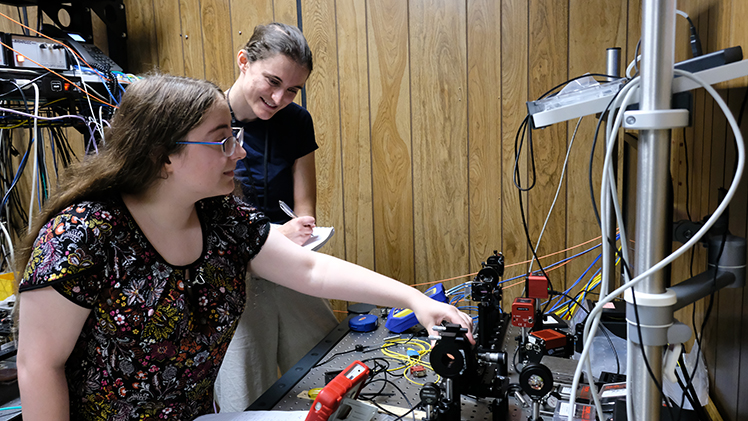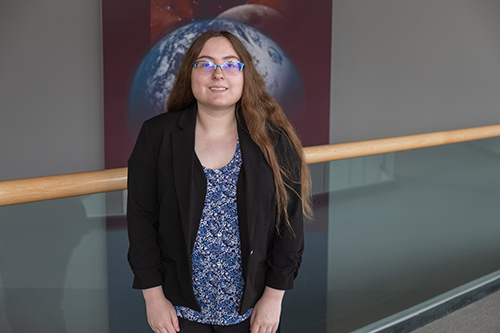Morgan Spooneybarger enrolled at The University of Toledo with a keen interest in astrophysics but was not certain about what she might do with her studies after graduation.
Over the last four years, the soon-to-be-minted graduate of the College of Natural Sciences and Mathematics found her calling.

CELEBRATING SUCCESS: UToledo recognizes the Class of 2024 with a series of stories featuring students receiving their degrees at spring commencement.
“When I came to UToledo, I knew I was going to major in physics and I was not thinking about anything else after that,” she said. “Now I have a sense of purpose. I know what I’m doing next and I have clearly defined goals.”
The next step on her journey also will be taken at UToledo. After earning her bachelor’s degree in applied physics, Spooneybarger will begin in the medical physics master’s program in the UToledo College of Medicine and Life Sciences.
“Medical physics is an area I found that I could really make the difference I was wanting to do,” she said. “I know there’s a lot of areas of improvement in medical physics right now and the research that’s coming out is really exciting. My overall goal is to end up somewhere that I can do clinical work and research. I still want to have that hands-on impact.”
Spooneybarger’s early years included several moves, as the family followed her father’s career in the U.S. Army. Eventually, they settled in Monroe, Michigan.
When it came time to look for colleges, it was important to Spooneybarger that she and her twin sister, Chloe — both first-generation students — ended up at the same school.
“She wanted to do a Pharm.D. program and I came in as an astrophysics student,” she said. “UToledo was one of like two colleges that had both degrees we were looking for, and of course they offered in-state tuition too, which sweetened the deal.”
After her first year, Spooneybarger realized that she was more suited to the lab than the telescope, and after evaluating the various physics concentrations offered at UToledo settled on applied physics.

Morgan Spooneybarger secured a coveted 10-week Space Communications and Navigation program internship at NASA’s Glenn Research Center last summer. Photo courtesy of NASA.
She also became an active research participant, working in the areas of atomic and nuclear, optics and condensed matter. For the last year, she’s been part of Dr. Michael Heben’s laboratory team, studying photovoltaics.
“Morgan is a highly motivated, highly focused self-starter who dives in deep,” said Heben, a Distinguished University Professor of physics and director of UToledo’s Wright Center of Photovoltaics Innovation and Commercialization. “Morgan wants to contribute to society and wants to apply her talents to important societal problems, and she has been able to pursue her passions and avail herself of the opportunities at UToledo.”
One of those opportunities was a coveted Space Communications and Navigation program internship at NASA’s Glenn Research Center last summer.
During her 10-week internship, Spooneybarger worked on NASA’s Real Time Optical Receiver project, which aims to improve communication between Earth and space using infrared light rather than radio waves.
Spooneybarger said being selected as a NASA intern — something she had been aiming to do since her senior year in high school — was an incredible experience that allowed her to expand her research experiences and build her professional network.

After earning her bachelor’s degree in applied physics, Spooneybarger will begin in the medical physics master’s program in the UToledo College of Medicine and Life Sciences. Photo courtesy of NASA.
It also helped her zero in on what she wanted to do after graduation.
“Prior to my internship I was thinking I’m going to get a Ph.D. in physics and I’m going to go where the physics is,” she said. “I kind of got exposed to that feeling of having a mission and knowing your research was driving everything forward. I wanted to be able to see the work I was doing be directly put into use.”
Medical physics, with its dual focus on research and clinical patient care, provided that avenue.
Spooneybarger praised the openness and availability of faculty in the Department of Physics and Astronomy and said having their support, along with courses that highlighted the breadth of the department’s offerings, helped her chart her own path.
And that’s what the faculty are there for, Heben said.
“Our job at The University of Toledo is to provide opportunity to our students,” he said. “The department is really well known for astronomy and photovoltaics, and it should be well known for the fact that it can lead to medical physics and a career in health science, too. We’re happy to provide the foundation that allows talented students like Morgan to find their passions and grow.”